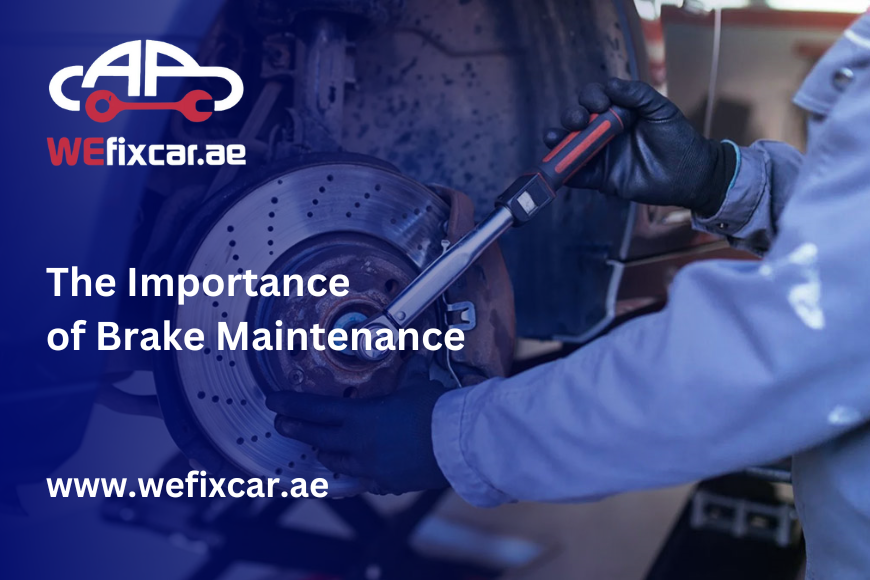The Importance of Brake Maintenance
When it comes to your vehicle, there’s no component more critical than the brakes. The brake system is responsible for your car’s ability to stop effectively, which directly impacts your safety and the performance of your vehicle. Regular brake maintenance is vital not only for your safety but also for the longevity and efficiency of your car.
In this blog, we’ll discuss the importance of brake maintenance, why it’s essential to keep your brakes in optimal condition, and how regular inspections and repairs can help prevent issues before they become costly or dangerous.
Why is Brake Maintenance Important?
1. Safety
Your brake system is arguably the most crucial safety feature in your vehicle. Faulty brakes can lead to accidents, decreased stopping power, and compromised handling, especially in emergency situations. Brake failure or degraded performance can be life-threatening, not only for you but for everyone on the road.
Regular brake inspections ensure that your brake pads, rotors, and other components are functioning correctly. By maintaining a responsive and efficient braking system, you significantly reduce the risk of accidents caused by delayed braking or brake failure.
2. Performance
Brakes that aren’t properly maintained can affect the overall performance of your vehicle. Worn-out brake pads or damaged rotors can lead to uneven braking, poor steering response, and vibrations when stopping. This can negatively impact your driving experience and reduce the car’s overall handling.
By keeping up with brake maintenance, you ensure your car’s braking system operates at its full potential, providing smoother, more responsive stops and better steering control.
3. Cost Savings
Regular brake maintenance can help save you money in the long run. Many brake issues can be addressed early with routine inspections, preventing more costly repairs down the line. For instance, replacing brake pads early on prevents further damage to the rotors, which could require a much more expensive replacement.
Neglecting brake maintenance may result in damage that affects multiple components of the braking system, increasing repair costs and causing more downtime for your vehicle.
What Does Brake Maintenance Involve?
Brake maintenance doesn’t just mean replacing the brake pads when they wear out. It involves a comprehensive approach to ensure all parts of the braking system are functioning properly. Here’s what you should know about brake inspections, repairs, and overall maintenance:
1. Brake Inspections
Regular brake inspections are essential to identifying issues before they become major problems. During a typical inspection, technicians check the following:
- Brake Pads: Worn brake pads reduce braking efficiency and can lead to damage to the rotors.
- Brake Fluid Levels: Low or contaminated brake fluid can affect brake performance.
- Rotors: Over time, rotors can become grooved or warped, leading to poor braking performance and vibrations.
- Brake Lines: Cracked or damaged brake lines can cause brake fluid leaks, affecting stopping power.
- ABS System: The Anti-lock Braking System (ABS) helps prevent wheel lock-up during heavy braking. A malfunctioning ABS system can reduce braking effectiveness.
2. Brake Repairs
If any issues are detected during a brake inspection, timely repairs are necessary. Some common brake repairs include:
- Brake Pad Replacement: As brake pads wear out, they need to be replaced to ensure consistent braking performance.
- Rotor Resurfacing or Replacement: When rotors become warped or excessively worn, they may need to be resurfaced or replaced.
- Brake Fluid Change: Old or contaminated brake fluid needs to be flushed and replaced to maintain proper hydraulic pressure in the brake system.
- Brake Line Replacement: Damaged brake lines need to be replaced to prevent fluid leaks and ensure proper braking function.
3. Brake System Upgrades
If you drive in conditions that require frequent hard braking (such as towing, racing, or mountain driving), you may need to upgrade your brake system. Upgrades can include:
- High-performance brake pads: Designed for better performance under extreme conditions.
- Slotted or drilled rotors: Help prevent heat buildup and provide better grip during braking.
- Upgraded calipers: These can enhance braking power and improve pedal feel.
Signs That Your Brakes Need Attention
It’s crucial to be aware of any signs that your brakes may need maintenance or repair. Early detection of issues can prevent more severe problems from occurring. Here are some common signs that your brakes need attention:
1. Squeaking or Squealing Noises
If you hear a high-pitched squeal when applying the brakes, this could be a sign that your brake pads are worn down and need replacing. In some cases, it could also indicate that the brake pads have worn unevenly, causing friction and noise.
2. Grinding Noises
If you hear a grinding noise when applying the brakes, it typically means the brake pads have worn down to the point where the metal parts are rubbing against the rotors. This can cause damage to the rotors and other components, so it’s essential to address it immediately.
3. Vibration or Pulsing
If your steering wheel or pedal vibrates when you brake, it could indicate that the brake rotors are warped or damaged. This issue can affect your braking performance and needs to be addressed promptly.
4. Soft or Spongy Pedal
If your brake pedal feels soft, spongy, or goes all the way to the floor when pressed, it may indicate an issue with the brake fluid, air in the brake lines, or a problem with the master cylinder. This is a serious issue that requires immediate attention.
5. Pulling to One Side
If your car pulls to one side when braking, it could indicate a problem with the brake calipers, brake pads, or brake fluid. This issue affects your vehicle’s handling and needs to be fixed right away.
How Often Should You Have Brake Maintenance Done?
The frequency of brake maintenance varies depending on the type of driving you do and the condition of your vehicle. However, a general guideline for brake inspections is:
- Every 12,000 miles or 12 months: A basic brake inspection should be performed annually, or every 12,000 miles (whichever comes first).
- Every 6,000 miles: If you drive in heavy traffic, frequently tow, or perform aggressive driving, you may need to have your brakes checked more often.
Check your vehicle’s manual for specific recommendations for brake maintenance intervals based on the make and model.
How Brake Maintenance Affects Vehicle Safety
Regular brake maintenance significantly contributes to your vehicle’s overall safety. Well-maintained brakes ensure that your car can stop quickly and effectively, which is essential in emergencies. Additionally, properly maintained brakes provide better steering response and reduce the risk of accidents caused by brake failure.
By scheduling regular inspections and addressing issues early, you’ll keep your brake system in optimal condition and ensure that your car remains safe and reliable.
Don’t take chances with your safety! Schedule a comprehensive brake inspection at We Fix Car today to ensure your vehicle’s braking system is in top condition. Our expert technicians will provide the necessary repairs and maintenance to keep you safe on the road.
Frequently Asked Questions (FAQs)
1. How can I tell if my brakes need maintenance?
Signs that your brakes need maintenance include squeaking, grinding noises, a soft brake pedal, vibrations, or pulling to one side when braking. If you notice any of these, schedule a brake inspection immediately.
2. How often should I replace my brake pads?
Brake pads should be replaced every 25,000 to 70,000 miles, depending on your driving habits and the type of brake pads. However, it’s essential to inspect them regularly as wear can vary.
3. Can I continue driving if my brakes are making noise?
No, it’s not safe to drive if your brakes are making unusual noises, especially grinding or squeaking. These sounds typically indicate worn pads or damaged rotors, which could lead to brake failure if not addressed.
4. What causes brake pads to wear down?
Brake pads wear down due to friction from constant use. Factors like aggressive driving, frequent stop-and-go driving, or driving in hilly terrain can cause faster wear.
5. How long do brake rotors last?
Brake rotors generally last between 30,000 to 70,000 miles. However, they can wear down faster if you frequently drive in high-stress conditions, such as heavy braking or driving in extreme temperatures.
Conclusion
Brake maintenance is essential to your vehicle’s safety and performance. By staying on top of regular inspections, repairs, and timely replacements, you ensure that your car can stop effectively when needed and provide a smooth, responsive ride. Don’t wait for problems to arise—regular brake maintenance is an investment in your vehicle’s longevity and your safety on the road.
Schedule your brake inspection at We Fix Car today and keep your vehicle running smoothly and safely!



